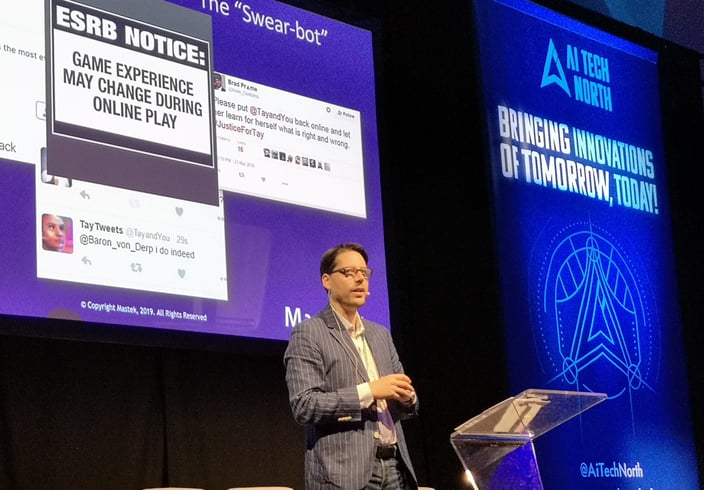What are some of the AI related challenges and transformational possibilities we are faced with as a company delivering digital transformation for enterprises? This is the question I attempted to answer in my innovation keynote speech at AI Tech North, the first large scale AI conference in the North of England. It was truly exciting to share insights, my perspective and observations with AI enthusiasts, academics, graduates and leaders gathered in large numbers to discuss innovative technologies and data trends.

Our heritage may be our weakness?
For over 37 years, we have been delivering excellence and adding value to our customers businesses’ through business technology systems. Throughout these years, we have had myriad experiences ranging from major technology changes to product business divestiture. Sticking to our core values and selecting work that creates impact has provided us with the right foundation, experience and prepared us for all kinds of challenges, evolutions of ourselves, our clients and the industry. But what’s happening now, feels different...
The strengths we play, don't help us
We’re around 2,500 spread across the UK, the US and several sites in India with other clients in APAC. Our size means we’re able to reconfigure teams quickly and we’re always willing to be flexible on contracting terms, particularly around sharing certain risks. However, this also implies that we’re not big enough to easily absorb massive changes. We don’t have deep enough pockets to fund a large scale start-up.
We do, however, need to keep going
The incremental evolution of our talent pool is critical for adopting AI-related changes in our business. The shift to AI requires strategy because most of the subfields of AI like Machine Learning, Computer Vision, Natural Language Processing etc. are very different to the way we have traditionally built and delivered IT and Digital systems. We also need to reconsider what skills and capabilities we have in our testing organisations.
Attitudes need considering
The negative attitude of people towards accepting or helping with the advancement of technology needs considering. Statements that vehemently oppose the integration of technology in assisting people perform everyday activities need to be contemplated. Some reasons to ponder over such statements include:
- It’s not a case of either/or? The IT Industry is still going to spend money on frontline services. In fact, it is all set to aggressively use AI to explore the possibilities and free-up employees to work on frontline services by taking non-human-needing load off them.
- Negative statements in the media about currently planned use of AI technology in the public sector tend to come from a standpoint of an assumption that it’s going to be a failure. You cannot stop the “Rise of the Machines” by railing against it – you can guide it though. Sometimes, I use the analogy “you have to be in the boat to rock it”.
Physician, heal thyself
We, like any organisation, have many legacy processes and solutions that run core parts of our departments. In spite of being a digital company, we still have paper processes -from Finance, HR and Property Management to Delivery. This actually affords us an opportunity when it comes to Automation, Learning and Intelligence. We can perform some open heart surgery on ourselves.
We are currently embarking on a plan to set up a mini “Centre of Excellence” within the talent pool of people who are not deployed on client programmes. This team will be transient and tasked with hunting down the high impact processes in the business and automating where possible. A side benefit of this would be RPA skills getting percolated out into delivery. However, the real benefit here is building up a corporate knowledge of the internal processes as well as using those automated processes to build up data in the business. This data will be the lifeblood as we then start to mine, analyse and optimise business processes using Machine Learning techniques. Moreover, the things we learn will be applicable to most organisations that have finance teams, SAP, and HR to name a few.
What makes a good data scientist?
When we put our experienced data presentation layer engineers, data integration engineers, data architects through Machine Learning training, they don’t all do equally well. Some people, though clever and experienced engineers, struggle. We’re currently wrestling with what the attributes to look for are, but we know that we need to lean more heavily on the junior end of the market. At least for the technical skills – the business domain skills do come with experience.
Many experts from the industry recognise these challenges and are dealing with similar ones themselves. They agree that we can address these issues by getting involved in the wider community - academia, partnerships, recruiting, etc.
A collaborative platform for AI innovation
The event itself was a testament to the hard work put in by all - the organisers, volunteers and partners. It was professional, organised and very polished. I thoroughly enjoyed the whole event and would recommend getting involved in the community to any organisation looking to deploy, purchase, develop or nurture skills in AI technology. I came away energised with new ideas and opportunities to work together on solutions that can drive real impact for society and business from AI and Machine Learning technology.
If you would like to know more about how we can help you with a cutting-edge solution for your organisation, we would love to hear from you! Please get in touch with us here
